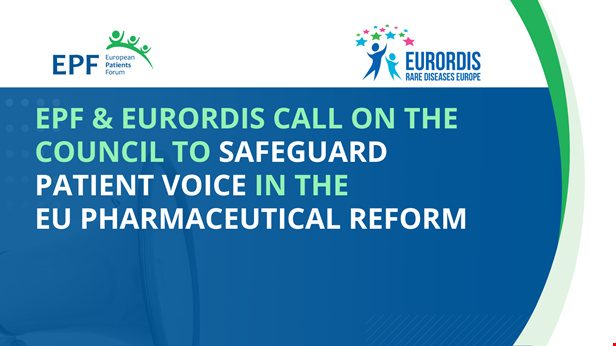EPF and EURORDIS Issue Joint Statement

No Future for Pharma Without Patients at the Table
As negotiations on the revision of the EU Pharmaceutical Legislation resume tomorrow, the European Patients’ Forum (EPF) and EURORDIS – Rare Diseases Europe urge the Council to carefully reconsider its position on patient involvement and to ensure that the upcoming discussions with the European Parliament and the European Commission preserve and strengthen the role of patients throughout the legislative process.
Over the past 25 years, increased patient engagement in regulatory decision-making has proven highly beneficial to reinforce trust in the regulatory system, improve health outcomes, and ensure that medicines developed and approved in Europe truly respond to patients' needs.
The EU should lead the way in patient involvement and embed it throughout the regulatory process for medicines. The attractiveness of the European continent should not only be based on its ecosystem for innovation, but also on its inclusive, evidence-based regulatory decision-making through rigorous involvement of patients. The EU pharmaceutical legislation represents a unique opportunity to do so and strengthen it further.
However, the Council’s position on the EU pharmaceutical legislation represents a notable regression in terms of patient involvement compared to the European Commission’s proposal and European Parliament’s report. Key issues include the removal of voting rights for patient and healthcare representatives in the Committee for Medicinal Products for Human Use (CHMP), reducing the number of representatives in the Pharmacovigilance Risk Assessment Committee (PRAC), and failing to mandate patient involvement in scientific working parties and patient consultation in guideline development, including for unmet medical needs (UMNs).
In June, EPF and EURORDIS, together with more than 70 patient organisations, launched the #KeepPatientsVoting campaign. The campaign continues today, more necessary than ever, to ensure that all decision-makers fully understand the consequences of weakening patient involvement in the EU Pharmaceutical Legislation.
Valentina Strammiello, Interim Executive Director of the European Patients' Forum, said: “Patients are the very reason healthcare systems exist. They are essential partners, not a “nice to have” with an ad hoc consultative role, but rather actors who must be structurally embedded in decision-making. Europe now has a crucial opportunity to strengthen meaningful patient engagement in regulatory processes and ensure that the future pharmaceutical framework truly serves people’s needs. This legislation will not be reopened for years to come, so it is imperative to get it right now.
Virginie Hivert, Acting Chief Executive Officer of EURORDIS, said: “For the rare disease community, patient involvement in regulatory decision-making is not a tokenistic gesture or abstract principle but rather an essential prerequisite to advance health equity and trust. With over 90% of people living with rare diseases lacking a curative treatment, their engagement is crucial for regulators to understand the real-world context behind every medicine – how it may impact quality of life and daily functioning, and how it may relate to remaining unmet needs. We hope that policymakers, in particular the Council, will understand that weakening patients’ involvement risks undermining the very aim of this legislation: to deliver safe, effective, and meaningful treatments to those who need them most.”
EPF and EURORDIS therefore encourage the Council to work collaboratively towards preserving and strengthening patient involvement in the context of the Trilogue negotiations. The patient voice must be institutionalised, systematic, and safeguarded throughout the legislation to ensure equitable access to medicines that truly meet patients’ needs.
